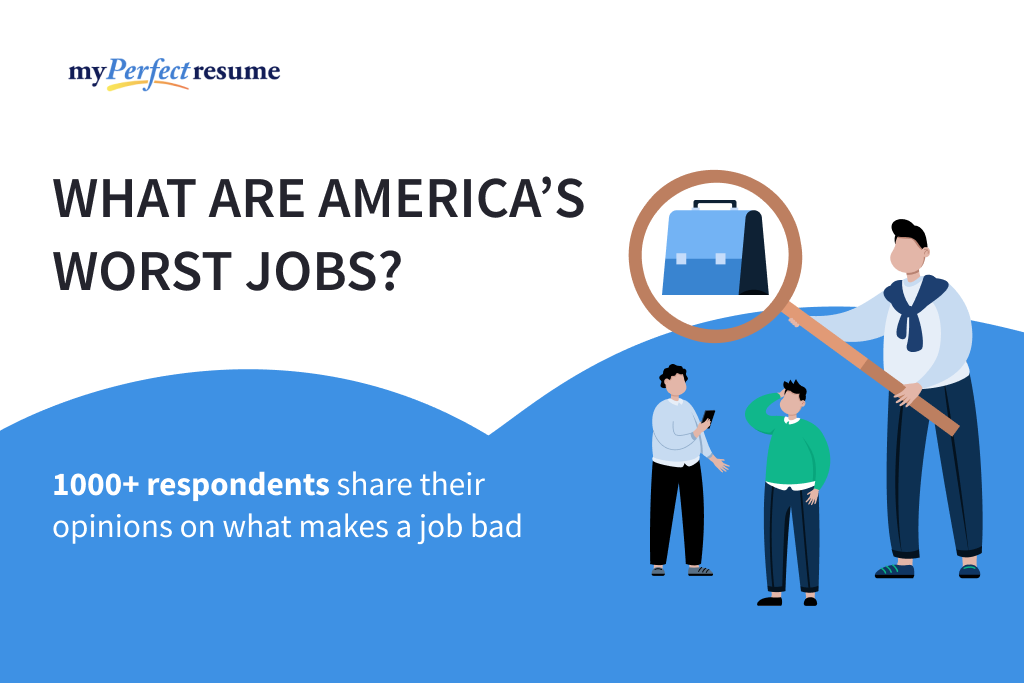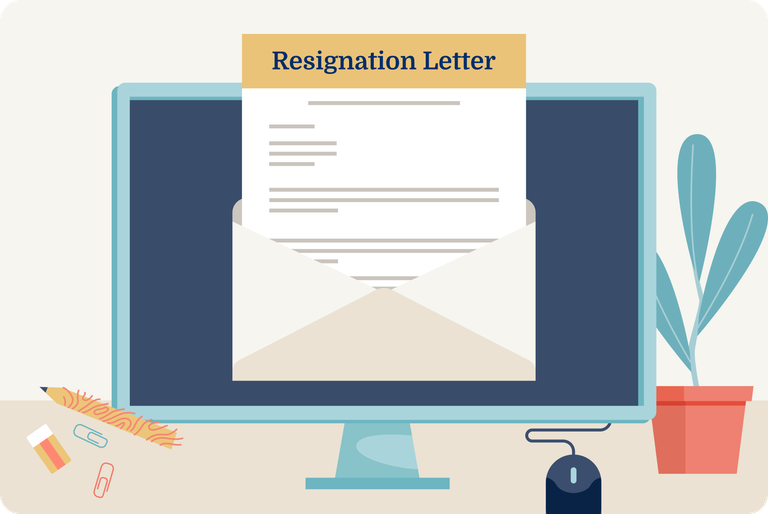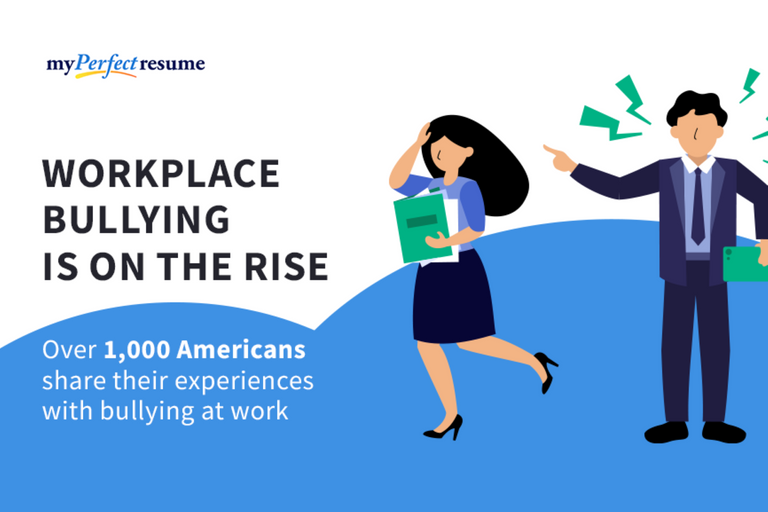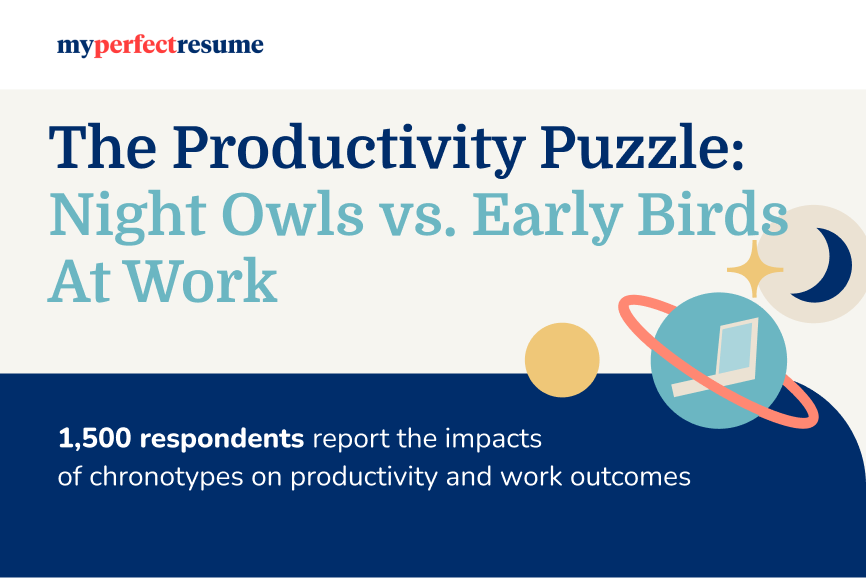What Are America’s Worst Jobs?
MyPerfectResume.com [January 07, 2025],
[https://www.myperfectresume.com/career-center/careers/basics/worst-jobs]

Our customers have been hired at: *Foot Note
We can all have a bad day, a bad mood, or even a bad temper. But for those trapped in bad jobs, a bad day can become an everyday occurrence.
Being stuck in a bad job leaves millions of Americans with unpredictable schedules, no chance for growth, and wages insufficient to support their families. Or themselves.
With no way out, they go through hell, and we’ve set out to discover which jobs are worst affected and why.
Key findings:
- When it comes to the job type, stressful (35%) and mentally tiring (31%) are considered the least desirable. Additionally, the “stressful” option choice suggests that females (40%) seem to be less stress-resistant than men (30%).
- Low earnings (42%), working with customers (39%), negative atmosphere at work (37%), and doing a meaningless job (37%) are the strongest negative job factors.
- Work forms which are believed to be the worst include working only at night (25%) and shift work (22%).
Researchers from the Good Jobs Institute have discovered that “Bad jobs are bad for workers.”
Yes, I know. “No kidding, Sherlock.” It does not sound like the most surprising finding ever.
But—
The data they provide reveals much more details. Here are just some of the alarming facts they uncovered:
- Low median wage. As many as 32% of the workforce—46.5 million people—worked in occupations with a median wage below $15 an hour.
- Poverty pay. An overwhelming number of Americans (53 million) make less than $17,950, below the poverty threshold of $25,700 for a family of four.
- No emergency fund. 4 out of 10 Americans, disproportionately Black, still cannot absorb an unexpected $400 expense.
- Reduced cognitive function. Stress lowers cognitive functioning, creating a “bandwidth tax” equal to a loss of 13 IQ points.
Less than $15 an hour is a constant struggle to make ends meet. Pay the bills, fill the fridge and your money is gone:
- Want to go crazy and buy something new to wear? Unlikely.
- Enjoy the luxury of housekeeping supplies and a nice shampoo? In your dreams.
- Unexpected expenses exceeding $400? Financial disaster.
- Leisure? Maybe in the next life.
Also—
Being a parent isn’t a piece of cake. And being a low-waged parent brings it all to a whole new level. Children born in a financially insecure family are more likely to develop chronic conditions as well as end up financially insecure themselves.
Calling low earnings a matter of life and death is not an exaggeration. An American Public Health study revealed the following:
- From 2008–2012, low wages contributed to between 2,800 and 5,500 premature deaths in New York City alone.
- Even a small pay rise can have a positive influence on a worker’s well-being. It addresses such issues as better nutrition, fewer unmet medical needs, less smoking, fewer low-birth-weight babies, fewer teen births, and less child neglect.
The truly heartbreaking thing is that low-wage workers live in a vicious cycle, which prevents them from accessing more opportunities. And unless there is a way to transform low-paying jobs into decent ones, the social frustration level won’t stop growing.
“This vicious cycle hurts customers with poor service, investors with lower profits, and employees with bad jobs. Beyond high employee turnover costs, low sales from poor customer service, and higher costs from operational problems, companies that operate in a vicious cycle find it hard to differentiate themselves from competitors, hard to adapt to changes in their environment, and hard or impossible to drive improvement through their employees.”
-Good Jobs Institute
Many employees are stuck in dead-end jobs, feeling underemployed and not earning even close to what they’re worth. They are getting more and more discouraged. And it shows.
In order to investigate how people feel about what they do, the Gallup study rated "good," "mediocre" and "bad" jobs based on 10 dimensions including pay, job security, benefits, and sense of purpose.
Let’s move on to our study now.
In a survey taken by more than 1,000 employees, we asked the respondents to rank 25 of the most common jobs in America. They also shared their attitudes toward factors that contribute to considering a job bad.
Keep reading to find out what makes a bad job bad. If you're thinking of leaving a bad job behind this year, check out our guide on how to write a resignation letter.
[Infographic] America's job rankings
Best and worst jobs
Ladies and gentlemen, here it is. America’s 2023 job ranking, from best to worst.
- Software developer
- Lawyer
- Teacher
- Administrative assistant
- Nurse
- Police officer
- Operations manager
- Medical assistant
- Bookkeeper
- Marketing specialist
- Cashier
- Electrician
- Mechanic
- Stocking associate
- Office clerk
- Store associate
- Carpenter
- Bartender
- Customer service representative
- Construction worker
- Truck driver
- Laborer
- Janitor
- Waiter/waitress
- Cleaner
Let’s look closely at the winners. And the losers.
Top 5 worst jobs
The top five worst jobs include:
- Cleaner—annual mean wage: $29,580 – $38,530
- Waiter/Waitress—annual mean wage: $29,010
- Janitor—annual mean wage: $31,860
- Laborer—annual mean wage: $31,440 – $44,130
- Truck driver—annual mean wage: $42,630 – $50,340
What all of the above jobs have in common is that you don’t need a college degree to get any of them. There were no significant differences in votes when it comes to the respondents’ gender, age, or political affiliation.
Top 5 best jobs
And our winners now. The top five best jobs are:
- Software developer—annual mean wage: $120,990
- Lawyer—annual mean wage: $148,030
- Teacher—annual mean wage: $36,460 – $133,310
- Administrative assistant—annual mean wage: $41,080 – $66,870
- Nurse—annual mean wage: $123,780
Let’s dig deeper. The votes for the best jobs varied based on demographics.
- Teacher was the gold medalist for females and respondents aged 41 or older.
- The younger respondents, aged 40 or less, picked lawyer as the best profession. Political independents shared this opinion.
- Software developer was a particularly prized job for males and Democrats.
- Republicans voted for nurse as the best job.
Other interesting research findings to mention:
- There is a noticeable difference between the earnings in jobs considered the best and those viewed as the worst.
- 4 out of 5 of the best jobs require at least a bachelor’s degree.
Where does it lead us? Does money indeed run the world? Not necessarily. Yet, the times when you could trade eggs for milk are far behind.
Explore resume templates and create your resume in a few simple steps.
A closer look at bad jobs
We asked the respondents a question: “What makes you think that a certain job is bad?”. They could choose three options at most. Here’s what we got:
- Low earnings—42%
- Working with customers—39%
- The negative atmosphere at work—37%
- Doing a meaningless job—37%
- Work monotony—36%
- No chances of growth—31%
- Disturbing tasks [e.g. requiring contact with death, human waste etc.] – 29%
- Other—6%
Okay. We can’t escape it.
Money talks. Whether we like it or not. But sometimes it’s just a whisper. Working with customers seems to be equally bad as a low salary – the difference between these two options is just 2%.
What makes a bad job?
Some jobs are, let’s say, bad by nature.
We cannot expect DJs to work 9 to 5, the same as it is impossible for medical workers to avoid night shifts. On the contrary, for a grocery store owner, starting a job late could be a risky move.
Let’s see which forms of work are viewed as the worst by our respondents.
- Working only at night is considered the least welcome option by one-fourth of the respondents. Surprisingly, answers given by the respondents suggest that the size of a company matters. For 35% of those employed in small companies (1–10 employees) working only at night seems the worst form of work. At the same time, the percentage drops to 23% in big companies (501+ employees).
- Shift work is almost as an unwanted form of work as working only at night—22% of respondents chose it as the worst option.
- 1 out of 5 respondents wouldn’t like to work on the weekend.
- Starting work very early in the morning (by very early, we mean 6:30 a.m. at the latest in this context) doesn’t seem appealing to 17% of the surveyed.
- 16% of the respondents view contract work as the worst work form.
Undesirable shifts can affect our private life. After all, planning free time with family or friends gets really difficult when you work on the weekend or at night.
When asked “Which type of job do you personally consider the worst?”, our respondents answered as follows:
- Stressful—35%
- Mentally tiring—31%
- Involving harmful working conditions—29%
- Physically tiring—27%
- Disrespected by society—24%
- Involving work with customers—21%
- Monotonous [repetitive, boring tasks]—21%
Interestingly, based on the given answers, women seem to be less stress-resistant. “Stressful job” as the worst option was chosen by 40% of females and by 30% of males. Though perhaps men just aren’t as willing to admit stress affects them.
Financial issues and benefits
Money again.
After all, “I love my job because it gives me no money" said no one ever.
Time to check which financial-related aspects of a job are considered the worst.
- No surprise here, the majority of the respondents (35%) see low earnings as the worst financial aspect of a job.
- Income depending on external factors [e.g. seasonality] seems particularly bad for 32%
- 13% of the respondents consider no chances to negotiate salary as the worst aspect.
- 1 out of 10 employees chooses no paid time off as the worst. And the same number of respondents chose no bonuses as the least desirable option.
In all five of the worst jobs in our study, the median annual wage is (much) less than $50,000 a year. While some people in parts of the country can live on this income, we should remember that members of these professions are also based in major cities, where the cost of living tends to be higher.
Next, an aspect of employment that’s not required by law, yet very much welcomed by workers.
Employee benefits. We asked which benefits would have the worst impact on the quality of a job if they’re not provided.
- No health insurance—21%
- No flexible working options—19%
- No paid time off—16%
- No retirement plans—16%
- No remote working options—15%
- No wellness programs—13%
No flexible working arrangements are viewed as the worst mainly by:
- Respondents who earn less than $25,000 a year—27%.
- Those with work experience of 11 years or more—25%.
- Employees from the healthcare industry—24%.
Work is no longer a place we go to 9-to-5, five days a week. Yet, it’s a double-edged sword.
Thanks to new technologies, many employees are expected to be responsive at all times. Consequently, work-life balance may suffer as the lines between work and the rest of our lives get blurred. At the same time, employees want more and different compensation in return.
Workplace atmosphere
We spend one-third of our lifetime at work. So the role of a positive workplace atmosphere is hard to overstate. What can ruin it then? Each respondent could check three options at most. Here are the findings:
- For almost 4 out of 10 (37%) of the respondents, poor leadership is what influences the workplace atmosphere the most negatively.
- 33% of the surveyed believe that lack of communication is the worst.
- Discrimination (30%), bad relations with colleagues (29%), and office gossips (29%) are perceived by the employees as equally harmful in the workplace.
- Bad relations with the boss, overwhelming tasks, no work-life balance, and being bullied are believed to be the worst by 26% of the respondents (same percentage for each option).
The worst thing about toxic workplaces is that they rarely stay at work.
They follow every step you take. You can “enjoy” their company when you try to get a decent night’s sleep, when you spend time with your loved ones, and when your mind should be out of work.
At a party, at the movies, at home. Always there for you.
A negative workplace atmosphere can lead to stress, burnout, and depression. It’s way more harmful than you might think.
“We all have bad Mondays, challenging weeks, and even disappointing months. That’s the cyclical nature of a career. However, you’re typically able to make it through a bad Monday, survive a challenging week, and learn valuable lessons from a disappointing quarter.
A toxic work environment is like having all of these challenges on repeat, without a break. It's red flags on top of red flags. It's a passive-aggressive boss or inappropriate comments from your coworkers about the person you replaced. It's reduced (or non-existent) boundaries.”
-Career Contessa
Stay away from toxic workplaces. They can damage your self-esteem and cause serious disruptions in your normal life. No job is worth it.
Natalie Baumgartner, Ph.D., chief workforce scientist at Achievers, shares her insights on a positive workplace environment:
“Employee engagement needs to be a way of doing business. Employers must create a strong culture, rooted in a core set of values and a shared mission. Leaders need to listen and act on employee feedback, celebrate employees and make them feel valued so that employees have a sense of purpose, meaning and, ultimately, satisfaction."
-Natalie Baumgartner, Achievers
Cheers to that! For mental health’s sake.
Jobs impact personal life and well-being
The last question in the survey regarded higher causes. Practical stuff aside.
The respondents were asked to focus on their feelings, emotions, and expectations toward a job to choose one aspect that they consider the worst. Here are what they answered:
- For 3 in 10 employees, lack of job satisfaction would be the worst.
- 21% of the respondents consider the low prestige of a job as the worst, while almost as many (20%) believe doing disturbing tasks [e.g. requiring contact with death] is the least desirable option.
- No chances of growth seem the worst option for 18% of the surveyed.
- 10% of the surveyed couldn’t deal with no actual contribution to the world [meaningless job].
Alison Green, a writer and work advice columnist who has been called “the Dear Abby of the work world”, wonders if there are actually any good jobs. Or maybe there are no good or bad jobs but rather different ways how we feel about ours? Here’s her advice:
“Often the best thing to do is to figure out what you, personally, can live with. Maybe you can tolerate a bit of management dysfunction if the work is interesting and your co-workers are decent people, as long as the organization isn’t actively doing harm in the world. Maybe you’ve learned that management dysfunction gets under your skin in a way you can’t ignore, but you’re OK with somewhat boring work in exchange for competent leadership and stability. Maybe you don’t care about any of that and just want a decent commute, reasonable pay, and no calls on your off hours. All those combinations exist; you just need to be frank with yourself about what trade-offs you’re willing to live with.”
-Alison Green
Kyle Kensing, online content editor at CareerCast, approaches job rankings from a bit different perspective. And it’s really comforting.
If you're interested in one of those jobs, its ranking shouldn’t dissuade you. Just because it ranks near the bottom doesn’t mean it’s not a great job. A lot of them are vital to our society. This just gives you an educated look at the challenges that come with them.
-Kyle Kensing, CareerCast
Whatever your job is, wherever ranked, and however commented, the most important thing is how it makes you feel.
It is never just a job.
Professional life has a great influence on our general well-being. And job satisfaction goes hand in hand with life satisfaction.
Key takeaways
- The top five worst jobs are cleaner, waiter/waitress, janitor, laborer, and truck driver.
- The best jobs include software developer, lawyer, teacher, administrative assistant, and nurse.
- Cleaner ranked at the very bottom, while software developer is at the very top of the ranking.
- 1 in 5 respondents sees health insurance (21%) as the most important benefit. Almost as many (19%) chose lack of flexible working options.
- For almost 4 out of 10 (37%) of the respondents, poor leadership is what influences the workplace atmosphere the most negatively, while 33% of the respondents choose lack of communication as the most harmful.
- There is a noticeable difference between the earnings in jobs considered the best and those viewed as the worst.
- 4 out of 5 of the best jobs require at least a bachelor’s degree. At the same time, no formal education is needed for any of the jobs considered the worst.
- More than one-third of respondents believe that low earnings (35%) and income depending on external factors (32%) are the worst financial-related aspect of a job.
- When it comes to higher causes, for 3 in 10 employees, lack of job satisfaction was the worst, while 21% of the respondents saw low prestige as the least welcome.
Methodology
We surveyed 1069 American respondents online via a bespoke polling tool. They were asked questions about factors that contribute to considering a job bad. The survey questionnaire also included a part with scoring the given professions. All respondents included in the study passed an attention-check question. The data presented represents the views of a randomized group of survey respondents and does not necessarily reflect the official policy or position of MyPerfectResume.
Fair use statement
Want to share the findings of our research? Go ahead. Feel free to use our images and information wherever you wish. Just link back to this page, please—–it will let other readers get deeper into the topic. Additionally, remember to use this content exclusively for non-commercial purposes.
About Us
At MyPerfectResume, we’re here to help individuals improve their work lives. Our mission is to provide support and resources to help you succeed in finding a great job. Explore our extensive collection of expert-written resume examples, professional resume templates, and user-friendly online resume builder to craft a standout resume that opens doors to new opportunities and helps you transition into a more rewarding career. Start building your path to success today.
How we reviewed this article
Since 2013, we have helped more than 15 million job seekers with our user-friendly tools and career advice articles. We have a rigorous editorial process to ensure that our content is helpful and accurate. Explore our recent employment studies and press coverage and discover why our certified career experts are a trusted source for professionals worldwide.
Sources
- Career Contessa, “10 Signs You’re in a Toxic Work Environment”
- Green, A., “Are All Jobs... Bad?”
- Indeed, “25 Most Common Jobs in America”
- Kelly, J., “More Than Half Of U.S. Workers Are Unhappy In Their Jobs: Here’s Why And What Needs To Be Done Now”
- U.S. Bureau of Labor Statistics, “May 2021 National Occupational Employment and Wage Estimates”
- U.S. Bureau of Labor Statistics, “Occupational Outlook Handbook”
- Wilkie, D., “What’s the Difference Between a ‘Good’ Job and a ‘Bad’ Job?”
Our customers have been hired at:*Foot Note

















